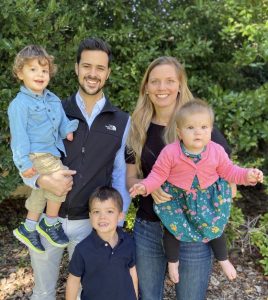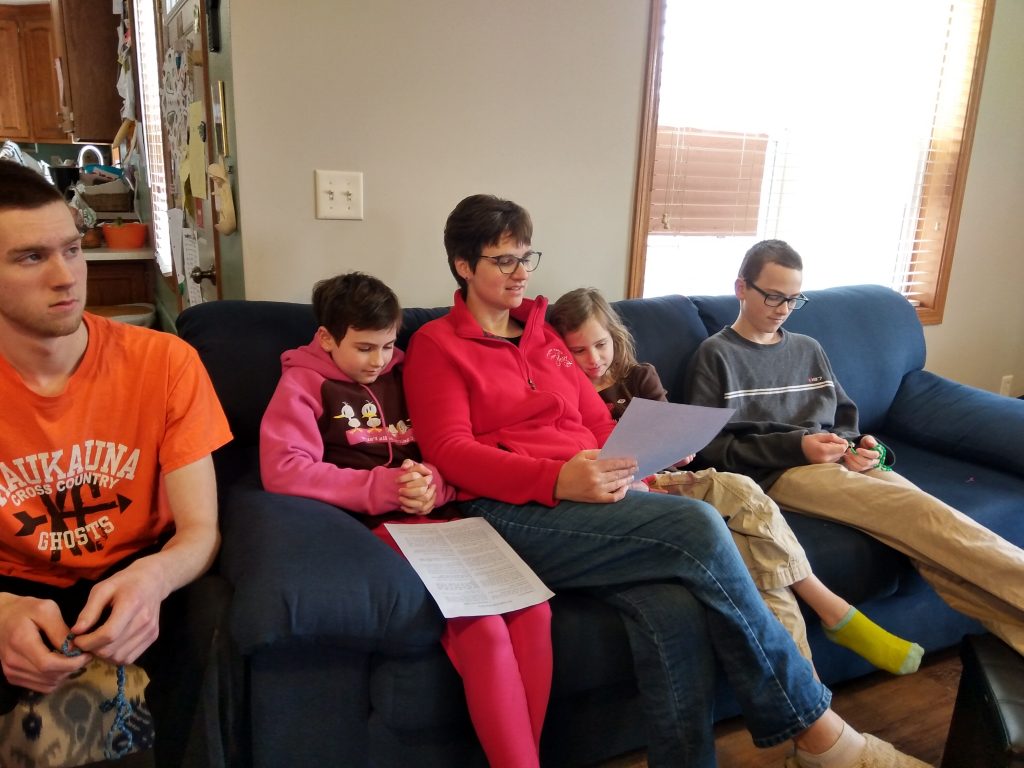Noelle Mering is an author and mother of six living near Los Angeles. Alongside her life as a homemaker, she writes frequently on culture, politics, and religion for various news outlets, and her co-authored book “Theology of Home” hit bookshelves last year.
Like many families with several kids, a daily routine helps organize much of their day. For Noelle and her husband, Adam, it involves daily Mass, getting the kids off to school, and then setting to work: Adam at his job at a large staffing firm, and Noelle at her writing desk at home.
Several weeks ago, that routine was pretty much the same as always. But in mid-March, alongside millions of other families, the coronavirus (COVID-19) rocked their world.
“It’s a lot to wrap our minds around — the financial and health implications seem so grave,” Noelle told Angelus.
California Gov. Gavin Newsom’s March 19 stay-at-home order has confined all eight Merings under one roof, only leaving for essential errands such as grocery shopping and doctor’s appointments. Plus, like many dioceses across the world, public Masses in the Archdiocese of Los Angeles have been suspended and churches closed, making even sacramental grace hard to come by.
Under such heavy restrictions, how are families like the Merings, in California and across the country, trying to keep life moving?
‘Balancing order and flexibility’
In their new homebound life, the Merings have a house full of workers. All six children are receiving schoolwork from their teachers online, and Noelle and Adam carry on their work duties at home.
“My husband is on work calls throughout much of the day, and I’m finishing a book manuscript,” Noelle told Angelus, “so we have to be creative in finding quiet zones where we can — sometimes we take a call in the car or backyard!”

Planning and making meals is also a challenge; having everyone at home means a full table for breakfast, lunch, and dinner. But the hardest part of the confinement is not having the sacraments. “Normally, my husband and I go to Mass daily and confession weekly,” said Noelle, “so the deprivation of the sacraments is definitely the most difficult challenge.”
To keep life running smoothly, Noelle has built a new routine. “We’re trying to keep a nice balance of order and flexibility,” she explained. While allowing her kids to catch up on sleep, she has also given each of them a daily checklist that includes schoolwork, reading, and tidying the bedroom and living area. “Having it all spelled out lets them manage their time and keeps us from having to nag them,” she said.
Noelle said the Merings’ days aren’t just about duties. Games of Knockout basketball, skits, and building forts are balanced with time for family prayer; each day, the family participates in Bishop Robert Barron’s livestreamed Mass and says the rosary together after dinner.
Noelle admitted that her home isn’t a 24/7 paradise (they can’t escape “the occasional bickering here and there”), but she also sees this time as a great opportunity for family bonding. “This feels like a stolen pocket of time,” she said, “where we can have extended periods of time together.”
The little kid life, COVID-19-style
Not far from the Merings, Molly Rose and her family are living under the same regulations in their home in Orange County, but with a very different family dynamic. While the Mering children are all occupied with daily schoolwork, all three of Molly’s kids are too young for school, which means that her new daily routine involves its own creative strategy.
“One of the hardest adjustments for me is maintaining a sense of order during these times,” Molly told Angelus. “I want it to be like vacation, but my husband is still working full time (even if it is from home), and my kids need me even more than usual, since we don’t have the usual outlets of friends, parks, or babysitters.”
In light of the shift, one of Molly’s strategies is to keep as many of her normal habits in place as possible. “[I get] up before my kids so I can pray, drink coffee, and set the agenda for the day,” she explained.
After the kids wake up, she has breakfast with them and then starts play time. “We can still go for walks and play outside in our backyard, or bring out some toys we usually keep for rainy days.” After lunch, Molly puts the kids down for their naps and takes advantage of the quiet time to pray, attend Mass virtually, and read. The afternoon wraps up with another activity (“these days, usually a movie”), followed by family dinner with Molly’s husband, Bob. “Then he reads to them and puts them to bed while I get a break!”

When asked about other activities her family has tried to do together lately, Molly answered with a smile, “Does potty training count?” She has also been teaching her oldest to write his ABCs, and occasionally the family has virtual Mass while the kids are awake. “It’s funny to see how they participate (or not),” said Molly.
Amid the complications, the Roses have tried to foster gratitude. “We have a lot of peace,” Molly emphasized, “and remember to pray for those suffering more than we are, either because of sickness, a feeling of despair, or suffering economically.”
Back to (home) school
Of course, the coronavirus impact stretches far beyond California. In Kaukauna, Wisconsin (20 miles south of Green Bay), Nancy Vande Hey is juggling her own set of challenges.
Up until this year, Nancy had home-schooled all 11 of her children. After 13 years of that lifestyle, with her oldest married and her second oldest in college, she enrolled the rest of her children in traditional school. On top of that, her husband took on the role of headmaster at the children’s new school.
Then the coronavirus struck.
“It was very hard on the kids,” Nancy told Angelus. “When they left school on a Monday, they thought they’d be seeing their teachers and friends the next day.”
Since the district closed schools March 13, Nancy has 10 of her 11 kids, ages 5 to 22, and her husband at home full time. Even though she has years of home-schooling experience, she emphasized how different the new situation is.
“When I home-schooled,” she said, “I had a lot of flexibility.” She could choose to extend certain lessons as needed or enroll her children in a course online or at the local school. “This is very different because I can’t make those decisions, and that’s hard.”
The regulations have also limited her children’s ability to work at their part-time jobs, visit friends, or go to the library. Moreover, while the Vande Heys usually see Nancy’s parents regularly, since the outbreak they have not been able to visit at all. “They are 85 and 90,” Nancy explained. “We all know that they are in that high-risk population.”
Despite the uncertainty and stress, Nancy has worked to establish pillars of regularity in her home. One lifeline has been “structured prayer times during the day.”
“We’ve been starting at 9 a.m. with the morning prayer our kids would do at school,” said Nancy. “At noon, we’ve been praying the Angelus, and at 3 o’clock, we pray the Divine Mercy Chaplet or the rosary.” These mile markers of prayer, she added, have been helpful in maintaining peace and trust.
“Stress and anxiety have been high,” she admitted, “but it’s been a powerful reminder to trust in Jesus and remember that we are not in control, as much as we would like to pretend that we are!”
Keeping up the connections
Nearly 1,000 miles further east in northern Virginia, Mike Barvick and his family are similarly busy reorganizing life in what’s become the new normal for American families: schools closed, sports canceled, Masses suspended, businesses operating remotely. “Our family has had to reorder our lives completely,” Mike told Angelus.
With three children in private school, two in public school, and one in college, the Barvicks have felt a wide range of impacts from the coronavirus — including managing different responses from different school systems, missing out on high school senior events, and wondering how to retrieve items from a college dorm in Dallas, which is under a shelter-in-place order.

While the Barvicks have built their own family routine, they have also found a creative outlet from those outside their home. “Our neighborhood has organized a weekly scavenger hunt for the younger kids,” said Mike. “On St. Patrick’s Day, each house put shamrocks and leprechauns in their windows for kids to find. They are changing the theme each week.”
After a recent scavenger hunt, one neighbor, delighted to see the decorations in an otherwise bleak time, sent out an email offering to donate coloring books to families with young children. The same neighbor also invited them to pick daffodils in her backyard — an offer that one of the Barvicks’ daughters did not refuse.
Like others, the Barvicks have sought out ways to connect with not only family and friends but also with the Church through livestreamed Masses and prayer. “We have been able to say a family rosary every day since the restrictions began,” said Mike. On March 19, the feast of St. Joseph, they took part in Pope Francis’ rosary, which he invited the entire universal Church to join at 9 p.m. Rome time.
‘Cheerful warriors’
The coronavirus has brought a slew of inconveniences, and sometimes major stressors, upon large families, who are scrambling for ways to keep the household organized, work spaces productive, and family members healthy. Amid the upheaval, those who see faith as central to family life have found hope.
While the sacraments are sadly unavailable, for many their absence has spurred an increased appreciation for them. “It feels providential in Lent,” said Noelle. “Our longing to receive our Lord has never felt so palpable!” The restrictions have at times sparked disappointment, stress, and anger, but in light of the pope’s call to prayer, these hurdles have also motivated families to deepen the faith within their homes.
“Our family has tried to be cheerful warriors,” said Mike. “I believe this has made our family stronger and appreciate the blessings that our country affords each of us.”
The coronavirus has affected millions of families in a variety of ways, some more severely than others. But armed with the support of loved ones and faith, these families are marching on. As Nancy put it, when all is said and done, “We really are going to be OK.”

